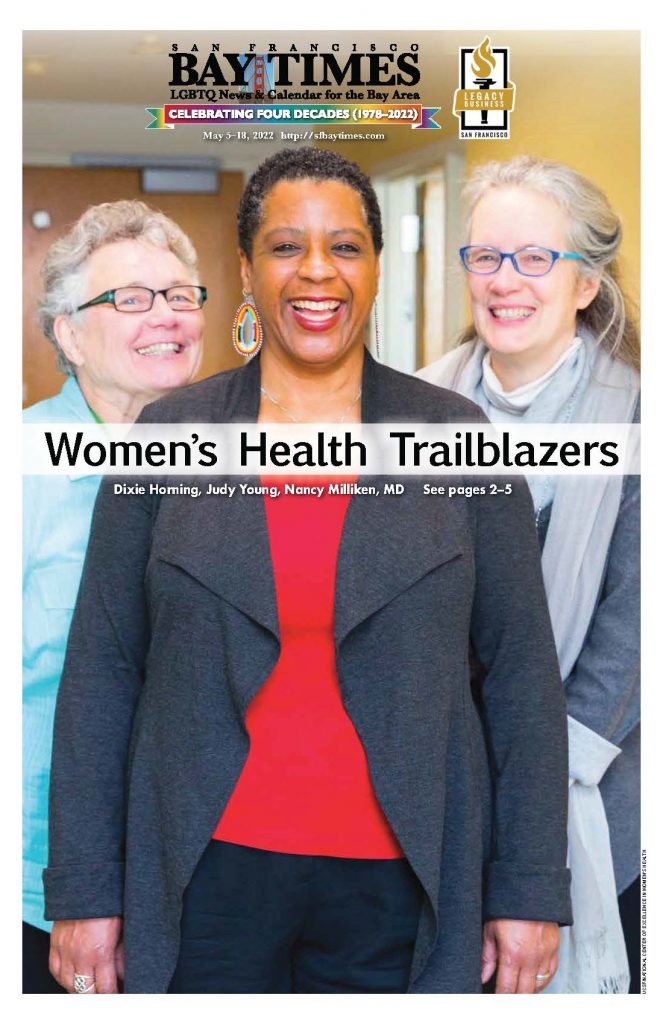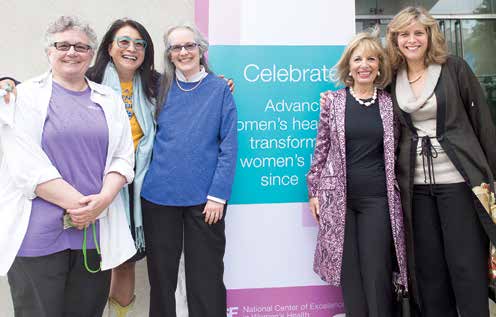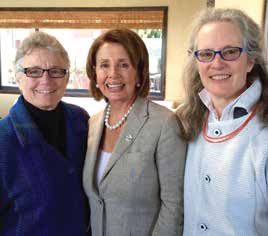
The UCSF National Center of Excellence in Women’s Health (CoE) was one of the first six federally designated centers created to advance women’s health and transform women’s lives through its sex and gender focus and support of rigorous research, innovative clinical care, educational curricula, inclusive leadership development, and respectful community partnerships. UCSF’s CoE defined the model of transformative change that was implemented nationally, including the 5 key pillars of the model: clinical care, education, research, community engagement, and leadership. Founding Director Dr. Nancy Milliken, who recently announced that she is retiring in 2022, was a key visionary on how to move those agendas across UCSF and across the country. Donors responded to this holistic approach that has sustained the CoE.
Readers may wonder why there was very little focus in 1996, when the CoE was founded, on women’s health, gender, culture, ethnicity, and race across the life span. These important issues were not often, or frequently at all, included in medical education or training for healthcare professionals. In addition, women and people of color were rarely included in research studies. It is impossible to cover the CoE’s impact over its 25-year history, but here are some highlights and reflections.
Challenging the Status Quo
The LGBTQ community has both directly and indirectly benefited from the CoE’s work and Dr. Milliken’s inclusion and radical thinking. Early in the CoE’s history, Dr. Milliken along with Tracy Weitz designed the first conference on the Centers of Excellence in Washington, DC. Key workshop topics included abortion and lesbian health. The Office of Women’s Health (OWH) thought these topics were too controversial and that there might be backlash if these topics were included in the conference. The OWH wanted the topics removed, but Dr. Milliken refused. It was too important to bring these critical issues of comprehensive women’s health to the forefront. There was no backlash. This was not the first or the last time that the CoE challenged the status quo, both directly or indirectly.

In addition to building and running efforts directly under Dr. Milliken’s leadership, the CoE advanced women’s health through community partnerships, financial sponsorship, administrative support, development of programs, and mentorship of emerging leaders. Examples include cohosting educational and community conferences such as a Lesbian Health Summit; the first international conference on the intersection of domestic violence and sex trafficking (which included NGOs from the LGBTQI community for the first time); a national academic and community partnership program; and the Young Women’s Health Conference co-founded by Congresswoman Jackie Speier.
Fostering Excellence
The CoE was selected to lead a multi-year, multi-million-dollar program, “Fostering Excellence in Women’s Health” funding partnerships across the country. This program enhanced CoEs with their partnerships with communities. Seven programs out of this cohort were awarded additional funds to implement programs in their local communities. Programs awarded through this competitive process received national recognition, involved attendance of yearly convenings, and received regular technical assistance and strategic support.
Examples of these programs include: 1) the CoE and school district in Jackson, Mississippi, which created a health education and promotion program to improve nutrition and physical activity in elementary schools and the surrounding community and 2) the CoE, a rural clinic and a domestic violence organization in Grand Forks, North Dakota, which partnered to bring intimate partner violence resources, education, training & capacity building to a rural clinic through the use of telehealth. Specific focus and outreach in North Dakota concerned military families.
UCSF CoE has multiple partnerships in the Bay Area, and one of these is BAYCAT, an organization that addresses racial, gender, and economic inequity by creating powerful, authentic media while diversifying the creative industry. Through the education and employment of low-income youth, young people of color, and young women in the Bay Area, and producing media for socially-minded clients, BAYCAT is changing the stories that get shared with the world.
The CoE’s longstanding commitment to working in partnership with the Bay Area’s diverse community has been an important thread that has taken many forms throughout the years. Programs include community education programs such as Mind Over Bladder, Heart Health, Fibroid education, Aging & Sexuality, Women’s Health Today, Teaching Kitchen, and Food as Medicine. There are also equity & justice activities and related programs such as the Oakland Mutual Aid Collective, Black Healing Sacred Space, the San Francisco Reproductive Justice Summit, and Serenity Art Series. Leadership development programs include the Youth Steering Committee, the Young Women’s Health & Leadership Summit, Innovators in Young Women’s Health, and the Getting Women in Internship Program.
Coordinated Clinical Care in a Centralized Space
In 2000, UCSF understood the importance of wraparound coordinated clinical care championed by the CoE model and designated the building at 2356 Sutter as the Women’s Health Center that housed OBGYN, Women’s Primary Care, Mammography, Women’s Imaging, Ultrasound, the Continence Center, the Fibroid Center, as well as the Women’s Health Resource Center. These programs have now expanded to Mission Bay and other locations throughout the Bay Area. The CoE was also an active participant in the design of the Betty Irene Moore Women’s Hospital at Mission Bay. Dr. Milliken collaborated with many women’s-focused care efforts across the university.
Young Women’s Health & Leadership Programs
Dr. Milliken founded a Young Women’s pipeline program co-sponsored by Congresswoman Jackie Speier, to provide opportunities to young women and non-binary youth to build community, learn about and develop public health campaigns for their peers, develop leadership skills, and learn about health careers.
The Youth Women’s Health Conference was the first youth conference in the country planned by youth for youth. Each year a new Youth Steering Committee was created from young women and non-binary youth from San Francisco public and charter schools. Youth were hired as UCSF employees and taught the skills to assess their health needs of their community of peers in order to plan the theme, speakers, workshops and all aspects of the conference. The model has now been benchmarked and re-created across the country. Over the course of 20 years, the CoE held 17 conferences impacting over 10,000 young women and non-binary youth.

Black Women’s Health & Livelihood Initiative
The UCSF Black Women’s Health & Livelihood Initiative (BWHLI), co-directed by CoE Executive Director Judy Young, MPH, and Andrea Jackson, MD, addresses root causes of health care disparities for Black women to achieve wellness and empowerment across the lifespan. The BWHLI focuses on current systemic health care inequities for Black women through 6 key areas: Justice & Equity, Health & Wellness, Community Building, Education, Leadership, and Construction of Knowledge & Research. To directly address the powerful and prevalent condition that Black women live in, the BWHLI creates programs at UCSF and in Bay Area communities so that Black women can lead, thrive, and contribute to their optimal potential at work, home, and in our communities.
A sampling of current programs and projects of the Black Women’s Health & Livelihood Initiative include:
Looking back on these as well as other achievements and the past 25 years of the CoE, Dr. Milliken told the San Francisco Bay Times: “I am grateful to all the co-conspirators that enabled advancement in women’s health and well-being. While there is more to be done, I am convinced that the emerging leadership at UCSF and in the Bay Area will champion and accelerate progress for women’s health and lives. I will be cheering them on.”
https://womenshealth.ucsf.edu/
Published on May 5, 2022
Recent Comments